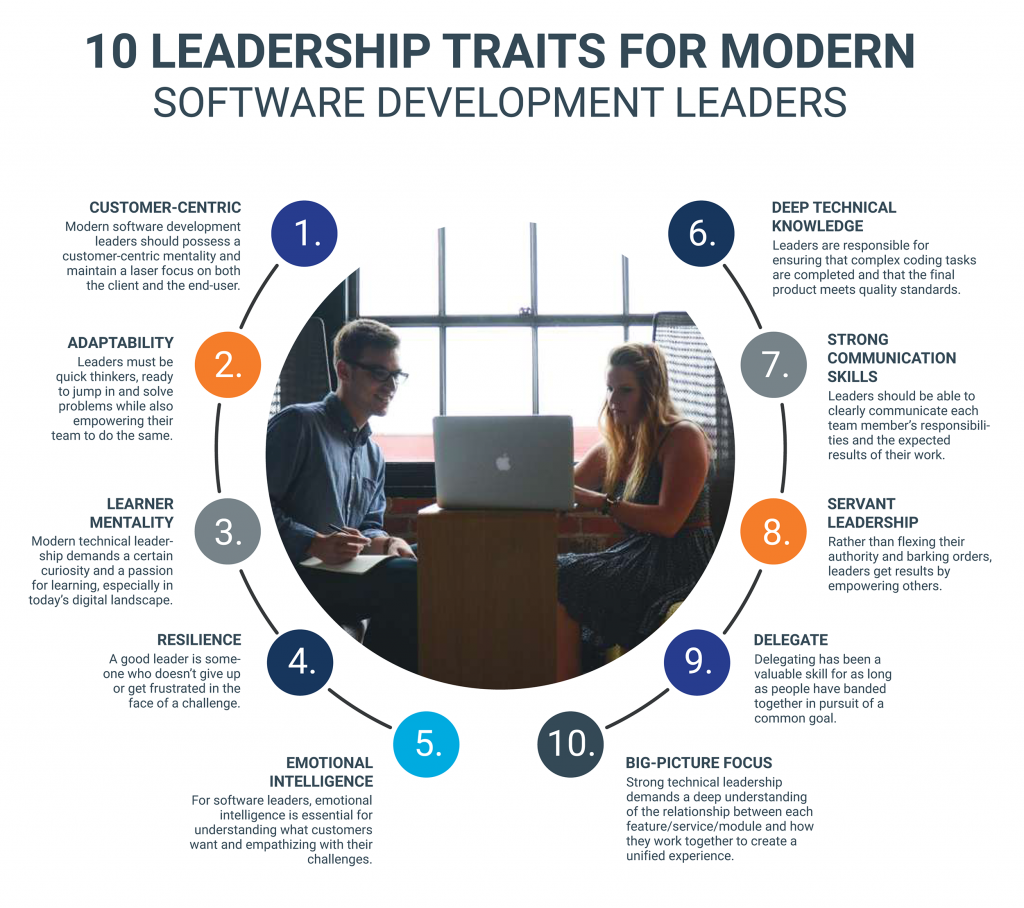
10 Leadership Traits for Modern Software Development Leaders
If you want to know how to lead a software team, it’s important to understand that technical leadership skills extend well beyond programming knowledge. Leading a software development team requires the perfect balance of technical expertise, emotional intelligence while also keeping a focus on the big picture.
In this article, we’ll look at the top ten software development leadership skills that, together, define what effective technical leadership looks like today. We’ll also share some insights from a recent internal survey with 3Pillar’s thought leaders for some additional perspective.
1. Customer-Centric
Customer experience shapes all aspects of the current software development landscape. Businesses look toward software providers and developers to help them understand customers in context and meet their ever-changing needs and rising expectations.
According to a recent report from Adobe, companies leading in customer experience are more likely to have exceeded 2019 business targets than their peers. As such, modern software development leaders should possess a customer-centric mentality and maintain a laser focus on both the client and the end-user.
3Pillar’s Eddy Vidal Nunez Garcia says that software development has become more “people driven, value driven; as opposed to something defined by processes and documentation.”
Keeping customer experience top of mind is essential for ensuring repeat business. After all, today’s brands–regardless of industry–compete on their ability to solve problems, anticipate needs, and surprise and delight their consumers.
Leaders need to make sure that the customer remains front and center throughout the development cycle.
2. Adaptability
Customer-centricity–and effective problem-solving–hinges on the ability to adapt to changing requirements and respond to new needs on-the-fly. In software development, things rarely go as planned. Unexpected snags are par for the course.
Projects change scope, as clients may decide to add or change features defined in the initial plan, or stakeholders might learn mid-way through that the end-user has a different vision of what the final project should look like.
As such, leaders must be quick thinkers, ready to jump in and solve problems while also empowering their team to do the same.
Beyond that, adaptability means that team leads must ensure that the right tools are in place so that the team can detect and respond to problems and changes as they happen rather than when it’s too late.
3. Learner Mentality
A love of learning is one of the defining characteristics of software developers and engineers.
According to Hired’s 2020 State of Software Engineering report, 82% of respondents said that “new challenges” and “continuous learning” were the main reasons they went into software engineering in the first place.
Modern technical leadership also demands a certain curiosity and a passion for learning, especially in today’s digital landscape, where companies compete on their ability to deliver innovative solutions before their competitors.
Strong leaders should be proactive about monitoring emerging trends, learning in-demand programming languages, and continuously upskilling both themselves and the entire team.
4. Resilience
Resilience may not be the first thing you think of when it comes to technical leadership skills. However, a good leader is someone who doesn’t give up or get frustrated in the face of a challenge.
According to 3Pillar Software Engineer Paul Estrada, “good leaders understand that things get difficult sometimes. They know how to push forward and keep making progress–overcoming challenges one step at a time.”
He also notes that leaders don’t always need to have all of the answers and that it’s just as valuable to ask for help.
5. Emotional Intelligence
If you want to know how to lead a software team, emotional intelligence tops the list. Sure, technical know-how is important, but an effective technical leader is also someone equally adept at managing something far less tangible: human emotions.
Emotional intelligence is becoming an increasingly critical competency across the entire workforce. Consider how many articles you’ve seen on the subject of empathy alone over the past several months.
For software leaders, emotional intelligence is essential for understanding what customers want, empathizing with their challenges, and getting individual contributors to deliver the best possible results.
[adinserter name=”Software-Development-eBook-Offer”]
6. Deep Technical Knowledge
In many cases, the best leaders may not be the strongest individual contributor–rather, they’re the ones who can effectively motivate others to achieve the target outcome.
That said, the whole “if you can’t do, teach” mentality doesn’t really apply when it comes to software development leaders. Instead, you want that rare individual who understands people and knows the entire tech stack inside and out.
3Pillar’s Javier Trevino says, “In general, tech leads should have strong technical skills in the following areas: design, estimation, implementation, debugging, testing, and deployment. At the end of the day, tech leads are responsible for ensuring that complex coding tasks are completed according to the specifications and that the final product meets quality standards.”
Software Engineer Paul Estrada adds, “Development leaders should have an in-depth knowledge of the full technology stack and keep a pulse on emerging technologies. Leaders should also make knowledge sharing a priority and help their team develop skills faster and avoid repeating the same mistakes.”
7. Strong Communication Skills
You can’t lead a software team without having excellent communication skills.
Abel Gonzalez Garcia says, “For me, the most important trait in a leader is good communication. Leaders should be able to clearly communicate each team member’s responsibilities and the expected results of their work. Also, a leader should be collaborative and able to motivate the team.”
It’s up to the team lead to communicate expectations, roles, and responsibilities–and pass client requirements on to the development team in a way that maintains the integrity of the initial plan. It’s also worth noting that the value of great communication extends beyond the team.
As 3Pillar Software Engineer Lead Jorge Millán points out, team leads are responsible for relaying messages between various stakeholders. He says, “Project managers must be able to effectively translate requirements and feedback between engineers/stakeholders/management/etc..”
Without that skill, software development projects can quickly devolve into an expensive, frustrating game of telephone where clients receive an end-product completely different than what they had in mind.
8. Servant Leadership
Servant leadership isn’t as drastic as it sounds. The idea is, leaders trade in traditional workplace hierarchies in favor of an approach that nurtures the development and growth of individual contributors.
This approach follows the logic that, rather than flexing their authority and barking orders, leaders get results by empowering others, helping them unlock their potential, and set up the team to work effectively.
9. Delegate
Delegating has been a valuable skill for as long as people have banded together in pursuit of a common goal. Still, it remains valuable and worth a mention.
Many leaders struggle with delegation, believing that they’re the only ones who can meet a certain set of standards.
While that unwillingness to let go has always been problematic, it could be a fatal mistake in today’s fast-paced, competitive landscape where even collaborative, empowered teams rely on AI to keep up with demand.
10. Big-Picture Focus
Finally, modern software development leaders must have the ability to zoom out and examine the big-picture. Some developers struggle with this as they’re used to maintaining a tight focus on one task at a time.
However, strong technical leadership demands a deep understanding of the relationship between each feature/service/module and how they work together to create a unified experience.
On an even broader level, that ability to shift focus enables leaders to ensure that they’re moving the needle in the right direction and won’t be blindsided by emerging trends/competitors/changing requirements.
Wrapping Up
As you can see, learning how to lead a software team means mastering a diverse set of skills–soft, hard, and strategic.
[adinserter name=”Software-Development-Closing”]
Recent blog posts

Stay in Touch
Keep your competitive edge – subscribe to our newsletter for updates on emerging software engineering, data and AI, and cloud technology trends.




